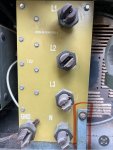According to the NEC if the generator and equipment are located on the same trailer or vehicle, then a grounding rod is not required.
Generator on a trailer and equipment on the trailer doesn't really give an electrical path to shock someone if properly installed to the trailer (bonded generator and trailer, properly wired equipment)
Pretty much every time I got shocked by a generator in the military was when it was attached to the truck with the commo equipment and the commo guys didn't properly ground their stuff. Shocks getting into and out of the vehicle, and shocks when connecting/disconnecting the cable to the vehicle.
Then to add, if you are hooking it to a house through a cord and plug, you also do not require a ground rod connection as the ground wire in the plug/cable is connected to the house ground system. It was explained to me by a commercial electrician that you only want a single ground connection in the system as otherwise the ground itself could act as a conductor (same basic reason why you remove the bonding strap in the generator when connecting to the house system, you only want a single path for the neutral and ground circuits) provided the ground circuit does not get switched with the generator (there are some transfer switches that will switch not only the hot wires, but also neutral and ground, though these are very rare in residential installations)
Below is from the 2023 NEC
250.34 Portable, Vehicle-Mounted, and Trailer-Mounted Generators.
(A) Portable Generators.
The frame of a portable generator shall not be required to be connected to a grounding electrode as defined in 250.52 for a system supplied by the generator under both of the following conditions:
(1) The generator supplies only equipment mounted on the generator, cord-and-plug-connected equipment through receptacles mounted on the generator, or both.
(2) The normally non-current-carrying metal parts of equipment and the equipment grounding conductor terminals of the receptacles are connected to the generator frame.
(B) Vehicle-Mounted and Trailer-Mounted Generators.
The frame of a vehicle or trailer shall not be required to be connected to a grounding electrode as defined in 250.52 for a system supplied by a generator located on this vehicle or trailer under all of the following conditions:
(1) The frame of the generator is bonded to the vehicle or trailer frame.
(2) The generator supplies only equipment located on the vehicle or trailer; cord-and-plug-connected equipment through receptacles mounted on the vehicle; or both equipment located on the vehicle or trailer and cord-and-plug-connected equipment through receptacles mounted on the vehicle, trailer, or on the generator.
(3) The normally non-current-carrying metal parts of equipment and the equipment grounding conductor terminals of the receptacles are connected to the generator frame.
250.30 Grounding Separately Derived Alternating-Current Systems.
In addition to complying with 250.30(A) for grounded systems, or as provided in 250.30(B) for ungrounded systems, separately derived systems shall comply with 250.20, 250.21, or 250.26, as applicable. Multiple power sources of the same type that are connected in parallel to form one system that supplies premises wiring shall be treated as a single separately derived system and shall be installed in accordance with 250.30.
Informational Note No. 1: An alternate ac power source, such as an on-site generator, is not a separately derived system if the grounded conductor is solidly interconnected to a service-supplied system grounded conductor. An example of such a situation is if the alternate source transfer equipment does not include a switching action in the grounded conductor and allows it to remain solidly connected to the service-supplied grounded conductor when the alternate source is operational and supplying the load served.
Article for the above links is here:

thompsonlearningco.com
EDIT: Not every jurisdiction uses the 2023 version of the NEC so you will want to verify with your local Jurisdiction Having Authority (JHA) as to what is code in your area.




